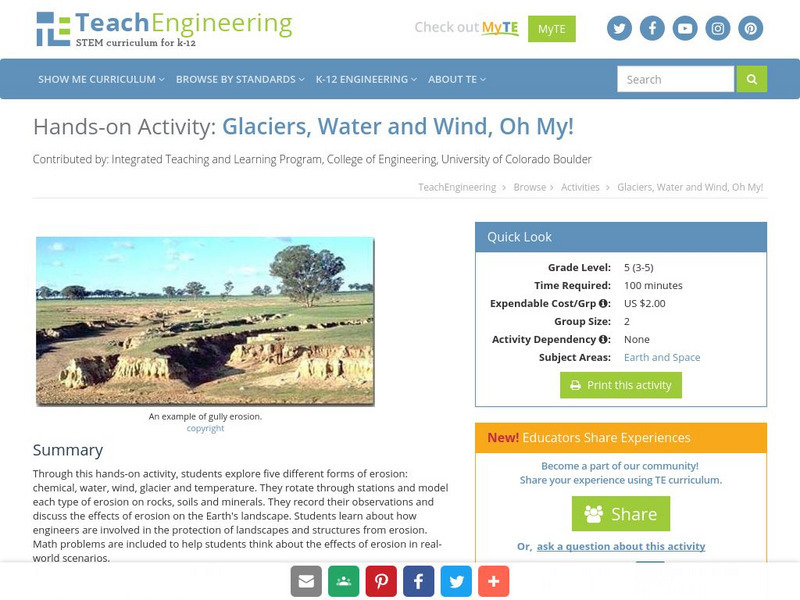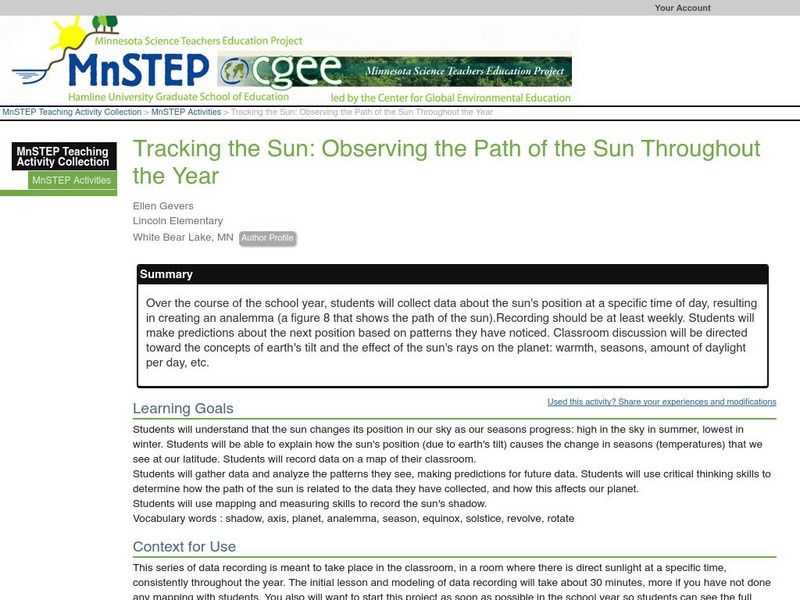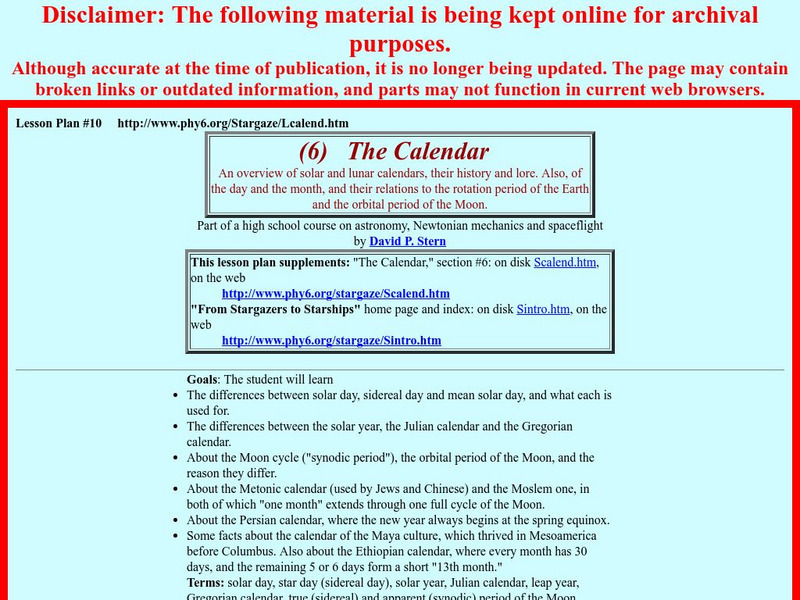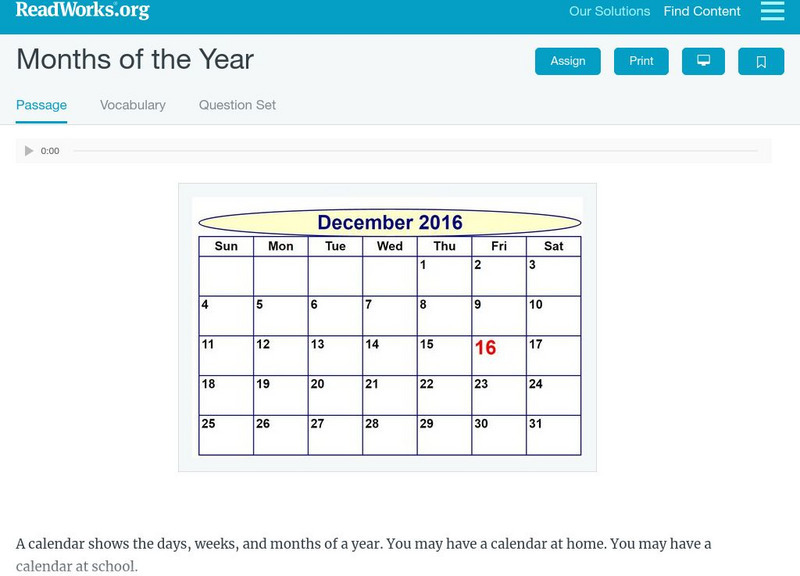Hi, what do you want to do?
TeachEngineering
Teach Engineering: Glaciers, Water and Wind, Oh My!
This hands-on activity explores five different forms of erosion (chemical, water, wind, glacier and temperature). Students rotate through stations and model each type of erosion on rocks, soils and minerals. The students record their...
OpenStax
Open Stax: Gyroscopic Effects: Vector Aspects of Angular Momentum
From a chapter on Rotational Motion and Angular Momentum in a Physics textbook. This section of the chapter explains how to use the right-hand rule to determine direction for angular velocity, momentum, and torque. Also discusses the...
PBS
Pbs Learning Media: Giving Rise to the Jet Stream
This interactive activity from NOVA Online uses animation and graphics to offer a detailed explanation of the jet stream. A thorough account is given of the role played by the Sun's heat and Earth's shape and rotation, among other factors.
Science Education Resource Center at Carleton College
Serc: Tracking the Sun: Observing the Path of the Sun Throughout the Year
Over the course of the school year, students collect weekly data about the sun's position at a specific time of day, resulting in creating a figure "8" that shows the path of the sun called an analemma.
Utah Education Network
Uen: Trb 3:1 Investigation 6 Celestial Model
Third graders will gain an understanding of why stars appear to move across the night sky.
CK-12 Foundation
Ck 12 Exploration Series: Simulations: Physics: Clarke's Dream
[Free Registration/Login Required] Learn about geosynchronous orbits and their use in satellite communication.
E-learning for Kids
E Learning for Kids: Science: Atlantic Ocean: Day and Night
This module explores day and night. Learn about what we see during the day and night and why we see what we see.
Better Lesson
Better Lesson: Our Stars
In this lesson, learners will observe and communicate how the stars are in the sky both day and night. The extremely detailed lesson includes photos and videos of the lesson in actions, examples of student's work, materials, parent...
Better Lesson
Better Lesson: Our Sky
What objects are in the day sky and the night sky? How do they seem to move? Come and explore with us as we discover the sun, moon, planets and stars! This detailed lesson plan includes pictures and videos of the instructional activity...
NOAA
Noaa: Southern Region Weather: Global Circulations
"Global Circulations explain how air and storm systems travel over the Earth's surface. The global circulation would be simple (and the weather boring) if the Earth did not rotate, the rotation was not tilted relative to the sun, and had...
Other
Bad Astronomy/phil Plait: Tides and Why Our Days Are Getting Longer
Why does the Moon always shows the same face to the Earth? Why is the Moon's rotation period the same as the length of time it takes to orbit the Earth? Why are there two tides a day? These questions and more are answered here.
NASA
Nasa: From Stargazers to Starships: The Calendar
A lesson plan that gives an overview of solar and lunar calendars, their history and lore. Also, of the day and the month, and their relations to the rotational period of the Earth and the orbital period of the Moon.For versions in...
National High Magnetic Field Laboratory
Magnet Academy: Foucault's Disk
Leon Foucault, a French physicist much better known for his pendulum demonstrating the rotation of the Earth, also created in 1855 a device that illustrated how eddy currents work. (Java tutorial)
Other
Lee Trampleasure: Science Education: Coriolis Effect
Examine three examples of the Coriolis Effect with reference to wind. The effect is that when an object is moving perpendicular to the rotation of a sphere the object will appear to travel in a curved line. Prevailing winds will look as...
National Weather Service
National Weather Service: Jet Stream: The Jet Stream
The concept of jet streams is explained on this site. Read about why jet stream winds blow from west to east, what the polar jet and subtropical jet are, the role that the rotation of the Earth plays, etc.
National Museums Liverpool
Liverpool Museums: The Sun Tracker
This simulation allows the user to see the sun's arc in the sky anywhere in the world at any time. By changing the season settings the user can see how seasons affect the height of the sun's arc.
Utah Education Network
Uen: Why Angle Changes Intensity
This hands-on activity will help students understand why summer is hotter than winter.
Wikimedia
Wikipedia: The Black Hole
This site examines the black hole as an object in astrophysics. Delve into this comprehensive resource that covers this concept from its history, to qualitative physics, the reality of black holes, mathematical physics and more.
Read Works
Read Works: Article a Day Set: Time
[Free Registration/Login Required] This Article-A-Day-Set provides six articles related to "time." Students will learn about the days of the week and months of the year.
Utah STEM Foundation
Utah Stem Action Center: Together We Can Rule the Galaxy
In this lesson, students will learn about Galileo Galilei and space.
Curated OER
Rocket Launched in Same Direction as Earth Orbit and Rotation
This site from the National Aeronautics and Space Administration provides a fun project on rockets. "Nothing in space stands still. Everything either orbits around something else, or moves toward or away from something else. So how do...
Other popular searches
- The Earth's Rotation
- Earth's Rotation Craft
- Earth's Rotation Seasons
- Earth's Rotation Orbit
- Earth's Rotation and Seasons
- Earth's Rotation on Axis
- Season's Earth's Rotation
- Gravity and Earth's Rotation
- Earths Rotation and Revolution
- Earths Rotation Revolution
- Earths Rotation and Seasons
- The Earths Rotation


















